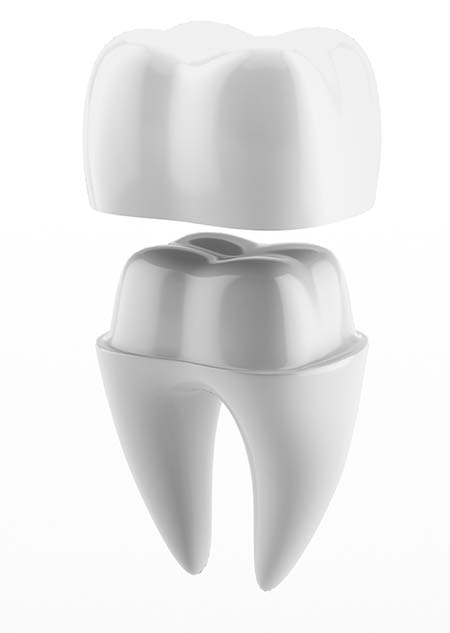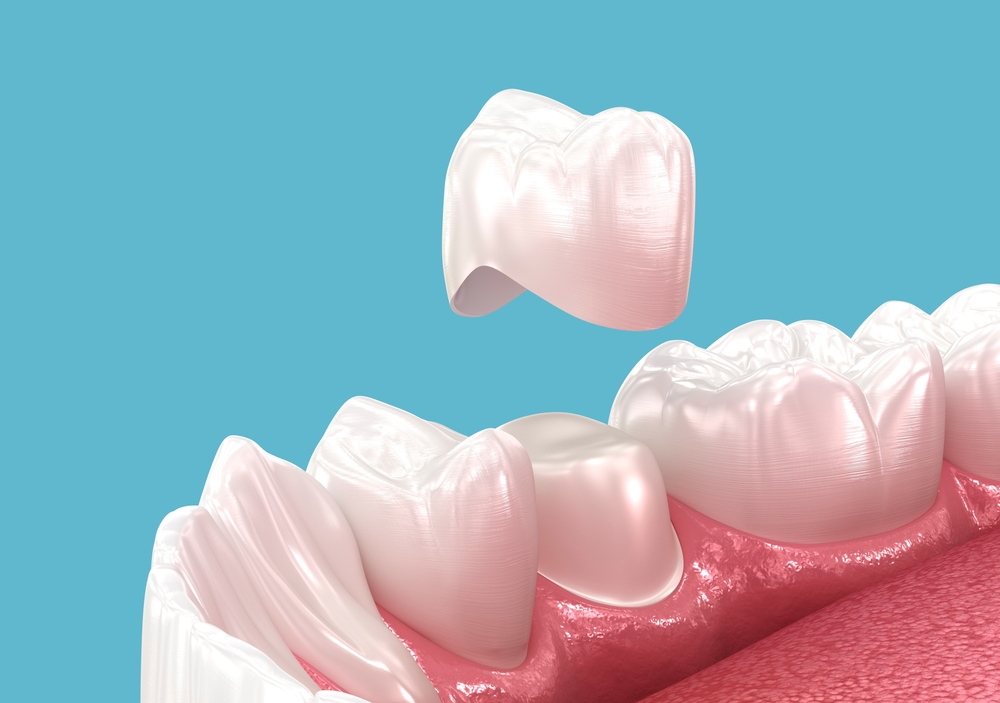Dental crowns, also known as caps, are prosthetic devices designed to cover a damaged tooth entirely. They restore the tooth’s shape, size, strength, and appearance. Crowns can be made from various materials such as porcelain, metal, or a combination of both, allowing for a customized solution for each patient’s needs.
Crowns serve multiple purposes, including:
- Protection of Weakened Teeth: When decay or injury erodes the structure of your teeth, a crown can help prevent further damage to a weak tooth.
- Restoration of Functionality: Crowns restore the ability to chew and bite properly by covering a tooth that has been broken or chipped.
- Concealing Aesthetic Imperfections: Discoloration, misshapen teeth, or those who have undergone root canal treatment can benefit from crowns to improve their appearance.
- Supporting Dental Bridges: Crowns can be used to anchor a dental bridge, which replaces one or more missing teeth.
- Restore Missing Teeth with Implants: Crowns can also be used to replace a missing tooth with the use of a dental implant.
Why Choose Dental Crowns?
There are numerous benefits associated with dental crowns. At Madison Dental Care, we ensure you receive the most appropriate treatment through a personalized approach. Here are some reasons to consider dental crowns:
- Durability: Dental crowns are built to withstand significant biting and chewing forces. Metal crowns, for instance, are particularly strong and long-lasting.
- Aesthetic Appeal: Crowns made from porcelain or ceramic can be precisely matched to the color of your natural teeth, providing a seamless look.
- Versatility: Crowns can address a wide range of dental issues, such as protecting a fractured tooth or improving the appearance of discolored teeth.
- Improved Functionality: By covering the damaged tooth, crowns restore your ability to eat and speak without discomfort.
The Process of Getting a Dental Crown
At Madison Dental Care, the dental crown procedure is a straightforward and patient-friendly process. Here’s what you can expect during your treatment:
Initial Consultation
During your first visit, our dentists will conduct a thorough examination to determine if a crown is the best option for you. We may take X-rays to assess the condition of your tooth and the surrounding bone structure.
Preparation of the Tooth
Once we’ve decided on the best course of action, we’ll begin the preparation of your tooth. This involves numbing the area with a local anesthetic, then reshaping the tooth to accommodate the crown. The amount of tooth reduction depends on the crown material choice.
Impression and Temporary Crown
After reshaping the tooth, an impression will be taken to create a custom-fit crown. You’ll receive a temporary crown to protect the prepared tooth while your permanent crown is being manufactured. This interim restoration allows you to maintain aesthetic appeal and functionality until the final crown is ready.
Crown Placement
When your permanent crown is ready, you’ll return for a second appointment. During this visit, we will:Remove the temporary crown.Clean the prepared tooth.Place the new crown to check its fit and adjust if necessary.Finally, the crown will be cemented securely in place, ensuring maximum comfort and stability.
Caring for Your Dental Crown
Maintaining your dental crown is essential for its longevity. Here are some simple tips to ensure your crown remains in excellent condition:
- Practice Good Oral Hygiene: Brush twice a day and floss daily, especially around the crown area.
- Regular Dental Visits: Schedule routine check-ups every six months to monitor the health of your crown and surrounding teeth.
- Avoid Hard Foods: Steer clear of hard candies, ice, or any food that can put excessive pressure on your crown.
- Protect Against Grinding: If you grind your teeth, consider using a mouthguard at night to protect both your crowns and natural teeth.



